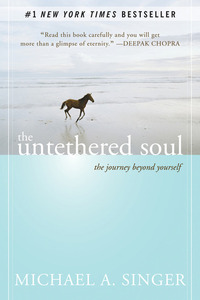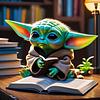Take a photo of a barcode or cover
informative
reflective
fast-paced
Can get a bit repetitive at times but this serves to really hammer the main points into your head. Singer is a strong writer who has come up with beautiful analogies to communicate a very interesting take on life and how to live it. Though I may not fully agree with every point he makes, I already feel more mindful and centered by practicing the thinking exercises and following the example that he sets by letting go.
The book was alright but I ultimately didn’t learn anything from it. It reinforces things I knew like the concept of letting go, chakras/ energy centers, consciousness, etc. I can understand how this book may be meaningful and life-changing for some people but for me, it just didn’t carry the same punch. Nonetheless, it was a solid read - 3 stars!
I read this book because of a random post on reddit, in which a person described how a small habit changed their life for the better: "Read 10 pages a day. Not to be smart, just to get your brain back."
That person ended up reading lots of books which fostered personal growth, and I felt identified with that because reading has also been rewiring my brain for the past months, and coincidentally I read some of the books mentioned in the post. So I was interested in reading the rest as well, The untethered soul among them.
The book is divided into five parts, of which "Part 1: Awakening conciousness" (chapters 1 to 4) is by far the best of them. Those chapters are really good, they are life-changing. Go read them. However, I was disappointed with the rest of the book.
I find this book to be very similar to The power of now, meaning that it has the same strengths and weaknesses.
I am not the best target reader because I don't consider myself a spiritual person, eventhough lately I find myself reading that kind of books and getting important lessons from them, but for me the main barrier in embracing them is spiritual language.
I get it. It's a language not meant to be taken literally, they describe concepts for which we don't have precise enough words, so they are suppossed to evoke some mental image, and it is that intuition what brings you the knowledge, not the literal meaning of words.
But still, I am so literal-minded that it is hard for me reading about energies inside our bodies, that are a source for action but also can get stuck and cause pain. I have to constantly translate the spiritual language to psychological language or something that feels more precise. As a matter of fact, I could substitute the word "energies" by "emotions" and then the book makes a lot more sense to me.
Another concept is that of "vibrational energy". I don't know what is vibrating, but low vibrational energy is supposed to be bad and high vibrational energy is supposed to be good. The physicist in me cringes when reading that. Infinity as well falls in that paradigm, so the quality of being infinite is good and being finite is bad. That is why the universe and the Self are supposed to be infinite. But being infinite is not the same as having no limits, for example planet Earth is bounded (finite in space) but has no boundaries (no border with an "Earth ends here" signpost). Whereas a "flat Earth" would have a boundary. Like Earth, the universe is probably finite without boundaries (the Big Bang is a good reason for that), not infinite as the book claims. And the Self? I think it's not meant to be physically infinite either, that would be so weird, it must be some kind of metaphor.
The key to happiness according to the book is to choose to be happy at every moment. From Man's search for meaning I learned that, more often than not, chasing happiness is a recipe for being miserable. Because you focus on what you're lacking instead of accepting and embracing what you have. What we should strive for is to find our intimate meaning in everything we do, and then on some occasions happiness will follow as a subproduct.
Actually that reasoning is not that far from what The untethered soul advocates for, because the idea is that choosing to be happy must come from an unfiltered acceptance of what our reality is, viewed as a gift from life no matter the circumstances, instead of hiding inside a mental construction of reality. But for me the promise of everlasting happiness as something you just choose is an oversimplification or a misunderstanding of what happiness actually is. However, I still found many other ideas in the book which I either agreed with or made me think a lot, and I am grateful for that.
That person ended up reading lots of books which fostered personal growth, and I felt identified with that because reading has also been rewiring my brain for the past months, and coincidentally I read some of the books mentioned in the post. So I was interested in reading the rest as well, The untethered soul among them.
The book is divided into five parts, of which "Part 1: Awakening conciousness" (chapters 1 to 4) is by far the best of them. Those chapters are really good, they are life-changing. Go read them. However, I was disappointed with the rest of the book.
I find this book to be very similar to The power of now, meaning that it has the same strengths and weaknesses.
I am not the best target reader because I don't consider myself a spiritual person, eventhough lately I find myself reading that kind of books and getting important lessons from them, but for me the main barrier in embracing them is spiritual language.
I get it. It's a language not meant to be taken literally, they describe concepts for which we don't have precise enough words, so they are suppossed to evoke some mental image, and it is that intuition what brings you the knowledge, not the literal meaning of words.
But still, I am so literal-minded that it is hard for me reading about energies inside our bodies, that are a source for action but also can get stuck and cause pain. I have to constantly translate the spiritual language to psychological language or something that feels more precise. As a matter of fact, I could substitute the word "energies" by "emotions" and then the book makes a lot more sense to me.
Another concept is that of "vibrational energy". I don't know what is vibrating, but low vibrational energy is supposed to be bad and high vibrational energy is supposed to be good. The physicist in me cringes when reading that. Infinity as well falls in that paradigm, so the quality of being infinite is good and being finite is bad. That is why the universe and the Self are supposed to be infinite. But being infinite is not the same as having no limits, for example planet Earth is bounded (finite in space) but has no boundaries (no border with an "Earth ends here" signpost). Whereas a "flat Earth" would have a boundary. Like Earth, the universe is probably finite without boundaries (the Big Bang is a good reason for that), not infinite as the book claims. And the Self? I think it's not meant to be physically infinite either, that would be so weird, it must be some kind of metaphor.
The key to happiness according to the book is to choose to be happy at every moment. From Man's search for meaning I learned that, more often than not, chasing happiness is a recipe for being miserable. Because you focus on what you're lacking instead of accepting and embracing what you have. What we should strive for is to find our intimate meaning in everything we do, and then on some occasions happiness will follow as a subproduct.
Actually that reasoning is not that far from what The untethered soul advocates for, because the idea is that choosing to be happy must come from an unfiltered acceptance of what our reality is, viewed as a gift from life no matter the circumstances, instead of hiding inside a mental construction of reality. But for me the promise of everlasting happiness as something you just choose is an oversimplification or a misunderstanding of what happiness actually is. However, I still found many other ideas in the book which I either agreed with or made me think a lot, and I am grateful for that.
Profound, elemental.
Simple but challenging.
It mirrors my internal idea to a certain degree, so it basically wrapped it in words for me and fleshed it out a little.
I also recognize that this is not a viewpoint that requires exact adherence but just take from it what fits your soul.
To recognize that everything is just in one’s head and then to actually apply it must be incredible hard for people that are caught up in their fears and identities. But if one can detach I think it will really free oneself from a lot of things and make life a happier place.
Such a simple and hard thing.
Simple but challenging.
It mirrors my internal idea to a certain degree, so it basically wrapped it in words for me and fleshed it out a little.
I also recognize that this is not a viewpoint that requires exact adherence but just take from it what fits your soul.
To recognize that everything is just in one’s head and then to actually apply it must be incredible hard for people that are caught up in their fears and identities. But if one can detach I think it will really free oneself from a lot of things and make life a happier place.
Such a simple and hard thing.
Focused on esoteric yoga. Very male.
Deciding “if you are willing to stay open”. This is coming off like “just be happy!” excluding anything mental health related.
informative
inspiring
reflective
slow-paced
challenging
informative
inspiring
reflective
slow-paced
When I first started this book, I felt myself resisting a lot of his ideas because he was very repetitive explaining the “what” but not the “how.” It was challenging to accept that ways in which we commonly define ourselves are not what defines us at all. My brain would almost hurt from frustration trying to make sense of *how* I’m supposed to separate myself from my thoughts and emotions. But towards the end, he goes more into how to practice these lessons and I’m grateful I stuck with it. These lessons are a challenge and take a level of consciousness I’m not used to operating on constantly but I’ve been practicing them daily and I feel better off for it.
This was a library book that I immediately bought as soon as I finished it so I can go back and highlight it and make notes. It jives with and brings into focus so many ideas about mindfulness that I have struggled with. I first learned about this book from a guest on Brene Brown’s podcast (I didn’t feel too bad since she hadn’t heard of it either). This is an area of life I keep working on and I am no where close to where I’d like to be, but this book really helped me to see WHY mindfulness is so important to pursue. My only criticism of this book is that it is not too focused on the HOW in my opinion, but I have other resources for that. It is also a bit repetitive but that actually was helpful for me. Rating 5 stars not for the writing but for the enlightening take on something that I have had trouble understanding.





